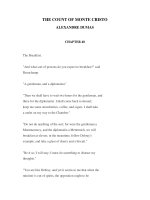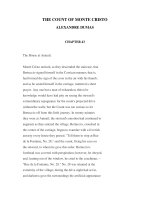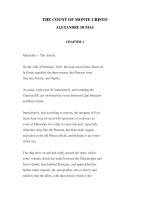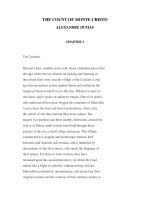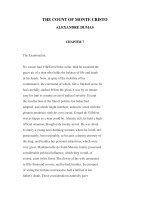THE COUNT OF MONTE CRISTO ALEXANDRE DUMAS CHAPTER 3 pps
Bạn đang xem bản rút gọn của tài liệu. Xem và tải ngay bản đầy đủ của tài liệu tại đây (46.07 KB, 18 trang )
THE COUNT OF MONTE CRISTO
ALEXANDRE DUMAS
CHAPTER 3
The Catalans.
Beyond a bare, weather-worn wall, about a hundred paces from
the spot where the two friends sat looking and listening as
they drank their wine, was the village of the Catalans. Long
ago this mysterious colony quitted Spain, and settled on the
tongue of land on which it is to this day. Whence it came no
one knew, and it spoke an unknown tongue. One of its chiefs,
who understood Provencal, begged the commune of Marseilles
to give them this bare and barren promontory, where, like
the sailors of old, they had run their boats ashore. The
request was granted; and three months afterwards, around the
twelve or fifteen small vessels which had brought these
gypsies of the sea, a small village sprang up. This village,
constructed in a singular and picturesque manner, half
Moorish, half Spanish, still remains, and is inhabited by
descendants of the first comers, who speak the language of
their fathers. For three or four centuries they have
remained upon this small promontory, on which they had
settled like a flight of seabirds, without mixing with the
Marseillaise population, intermarrying, and preserving their
original customs and the costume of their mother-country as
they have preserved its language.
Our readers will follow us along the only street of this
little village, and enter with us one of the houses, which
is sunburned to the beautiful dead-leaf color peculiar to
the buildings of the country, and within coated with
whitewash, like a Spanish posada. A young and beautiful
girl, with hair as black as jet, her eyes as velvety as the
gazelle's, was leaning with her back against the wainscot,
rubbing in her slender delicately moulded fingers a bunch of
heath blossoms, the flowers of which she was picking off and
strewing on the floor; her arms, bare to the elbow, brown,
and modelled after those of the Arlesian Venus, moved with a
kind of restless impatience, and she tapped the earth with
her arched and supple foot, so as to display the pure and
full shape of her well-turned leg, in its red cotton, gray
and blue clocked, stocking. At three paces from her, seated
in a chair which he balanced on two legs, leaning his elbow
on an old worm-eaten table, was a tall young man of twenty,
or two-and-twenty, who was looking at her with an air in
which vexation and uneasiness were mingled. He questioned
her with his eyes, but the firm and steady gaze of the young
girl controlled his look.
"You see, Mercedes," said the young man, "here is Easter
come round again; tell me, is this the moment for a
wedding?"
"I have answered you a hundred times, Fernand, and really
you must be very stupid to ask me again."
"Well, repeat it, repeat it, I beg of you, that I may at
last believe it! Tell me for the hundredth time that you
refuse my love, which had your mother's sanction. Make me
understand once for all that you are trifling with my
happiness, that my life or death are nothing to you. Ah, to
have dreamed for ten years of being your husband, Mercedes,
and to lose that hope, which was the only stay of my
existence!"
"At least it was not I who ever encouraged you in that hope,
Fernand," replied Mercedes; "you cannot reproach me with the
slightest coquetry. I have always said to you, `I love you
as a brother; but do not ask from me more than sisterly
affection, for my heart is another's.' Is not this true,
Fernand?"
"Yes, that is very true, Mercedes," replied the young man,
"Yes, you have been cruelly frank with me; but do you forget
that it is among the Catalans a sacred law to intermarry?"
"You mistake, Fernand; it is not a law, but merely a custom,
and, I pray of you, do not cite this custom in your favor.
You are included in the conscription, Fernand, and are only
at liberty on sufferance, liable at any moment to be called
upon to take up arms. Once a soldier, what would you do with
me, a poor orphan, forlorn, without fortune, with nothing
but a half-ruined hut and a few ragged nets, the miserable
inheritance left by my father to my mother, and by my mother
to me? She has been dead a year, and you know, Fernand, I
have subsisted almost entirely on public charity. Sometimes
you pretend I am useful to you, and that is an excuse to
share with me the produce of your fishing, and I accept it,
Fernand, because you are the son of my father's brother,
because we were brought up together, and still more because
it would give you so much pain if I refuse. But I feel very
deeply that this fish which I go and sell, and with the
produce of which I buy the flax I spin, I feel very
keenly, Fernand, that this is charity."
"And if it were, Mercedes, poor and lone as you are, you
suit me as well as the daughter of the first shipowner or
the richest banker of Marseilles! What do such as we desire
but a good wife and careful housekeeper, and where can I
look for these better than in you?"
"Fernand," answered Mercedes, shaking her head, "a woman
becomes a bad manager, and who shall say she will remain an
honest woman, when she loves another man better than her
husband? Rest content with my friendship, for I say once
more that is all I can promise, and I will promise no more
than I can bestow."
"I understand," replied Fernand, "you can endure your own
wretchedness patiently, but you are afraid to share mine.
Well, Mercedes, beloved by you, I would tempt fortune; you
would bring me good luck, and I should become rich. I could
extend my occupation as a fisherman, might get a place as
clerk in a warehouse, and become in time a dealer myself."
"You could do no such thing, Fernand; you are a soldier, and
if you remain at the Catalans it is because there is no war;
so remain a fisherman, and contented with my friendship, as
I cannot give you more."
"Well, I will do better, Mercedes. I will be a sailor;
instead of the costume of our fathers, which you despise, I
will wear a varnished hat, a striped shirt, and a blue
jacket, with an anchor on the buttons. Would not that dress
please you?"
"What do you mean?" asked Mercedes, with an angry glance,
"what do you mean? I do not understand you?"
"I mean, Mercedes, that you are thus harsh and cruel with
me, because you are expecting some one who is thus attired;
but perhaps he whom you await is inconstant, or if he is
not, the sea is so to him."
"Fernand," cried Mercedes, "I believed you were
good-hearted, and I was mistaken! Fernand, you are wicked to
call to your aid jealousy and the anger of God! Yes, I will
not deny it, I do await, and I do love him of whom you
speak; and, if he does not return, instead of accusing him
of the inconstancy which you insinuate, I will tell you that
he died loving me and me only." The young girl made a
gesture of rage. "I understand you, Fernand; you would be
revenged on him because I do not love you; you would cross
your Catalan knife with his dirk. What end would that
answer? To lose you my friendship if he were conquered, and
see that friendship changed into hate if you were victor.
Believe me, to seek a quarrel with a man is a bad method of
pleasing the woman who loves that man. No, Fernand, you will
not thus give way to evil thoughts. Unable to have me for
your wife, you will content yourself with having me for your
friend and sister; and besides," she added, her eyes
troubled and moistened with tears, "wait, wait, Fernand; you
said just now that the sea was treacherous, and he has been
gone four months, and during these four months there have
been some terrible storms."
Fernand made no reply, nor did he attempt to check the tears
which flowed down the cheeks of Mercedes, although for each
of these tears he would have shed his heart's blood; but
these tears flowed for another. He arose, paced a while up
and down the hut, and then, suddenly stopping before
Mercedes, with his eyes glowing and his hands clinched,
"Say, Mercedes," he said, "once for all, is this your final
determination?"
"I love Edmond Dantes," the young girl calmly replied, "and
none but Edmond shall ever be my husband."
"And you will always love him?"
"As long as I live."
Fernand let fall his head like a defeated man, heaved a sigh
that was like a groan, and then suddenly looking her full in
the face, with clinched teeth and expanded nostrils, said,
"But if he is dead"
"If he is dead, I shall die too."
"If he has forgotten you"
"Mercedes!" called a joyous voice from without,
"Mercedes!"
"Ah," exclaimed the young girl, blushing with delight, and
fairly leaping in excess of love, "you see he has not
forgotten me, for here he is!" And rushing towards the door,
she opened it, saying, "Here, Edmond, here I am!"
Fernand, pale and trembling, drew back, like a traveller at
the sight of a serpent, and fell into a chair beside him.
Edmond and Mercedes were clasped in each other's arms. The
burning Marseilles sun, which shot into the room through the
open door, covered them with a flood of light. At first they
saw nothing around them. Their intense happiness isolated
them from all the rest of the world, and they only spoke in
broken words, which are the tokens of a joy so extreme that
they seem rather the expression of sorrow. Suddenly Edmond
saw the gloomy, pale, and threatening countenance of
Fernand, as it was defined in the shadow. By a movement for
which he could scarcely account to himself, the young
Catalan placed his hand on the knife at his belt.
"Ah, your pardon," said Dantes, frowning in his turn; "I did
not perceive that there were three of us." Then, turning to
Mercedes, he inquired, "Who is this gentleman?"
"One who will be your best friend, Dantes, for he is my
friend, my cousin, my brother; it is Fernand the man
whom, after you, Edmond, I love the best in the world. Do
you not remember him?"
"Yes!" said Dantes, and without relinquishing Mercedes hand
clasped in one of his own, he extended the other to the
Catalan with a cordial air. But Fernand, instead of
responding to this amiable gesture, remained mute and
trembling. Edmond then cast his eyes scrutinizingly at the
agitated and embarrassed Mercedes, and then again on the
gloomy and menacing Fernand. This look told him all, and his
anger waxed hot.
"I did not know, when I came with such haste to you, that I
was to meet an enemy here."
"An enemy!" cried Mercedes, with an angry look at her
cousin. "An enemy in my house, do you say, Edmond! If I
believed that, I would place my arm under yours and go with
you to Marseilles, leaving the house to return to it no
more."
Fernand's eye darted lightning. "And should any misfortune
occur to you, dear Edmond," she continued with the same
calmness which proved to Fernand that the young girl had
read the very innermost depths of his sinister thought, "if
misfortune should occur to you, I would ascend the highest
point of the Cape de Morgion and cast myself headlong from
it."
Fernand became deadly pale. "But you are deceived, Edmond,"
she continued. "You have no enemy here there is no one
but Fernand, my brother, who will grasp your hand as a
devoted friend."
And at these words the young girl fixed her imperious look
on the Catalan, who, as if fascinated by it, came slowly
towards Edmond, and offered him his hand. His hatred, like a
powerless though furious wave, was broken against the strong
ascendancy which Mercedes exercised over him. Scarcely,
however, had he touched Edmond's hand than he felt he had
done all he could do, and rushed hastily out of the house.
"Oh," he exclaimed, running furiously and tearing his hair
"Oh, who will deliver me from this man? Wretched
wretched that I am!"
"Hallo, Catalan! Hallo, Fernand! where are you running to?"
exclaimed a voice.
The young man stopped suddenly, looked around him, and
perceived Caderousse sitting at table with Danglars, under
an arbor.
"Well", said Caderousse, "why don't you come? Are you really
in such a hurry that you have no time to pass the time of
day with your friends?"
"Particularly when they have still a full bottle before
them," added Danglars. Fernand looked at them both with a
stupefied air, but did not say a word.
"He seems besotted," said Danglars, pushing Caderousse with
his knee. "Are we mistaken, and is Dantes triumphant in
spite of all we have believed?"
"Why, we must inquire into that," was Caderousse's reply;
and turning towards the young man, said, "Well, Catalan,
can't you make up your mind?"
Fernand wiped away the perspiration steaming from his brow,
and slowly entered the arbor, whose shade seemed to restore
somewhat of calmness to his senses, and whose coolness
somewhat of refreshment to his exhausted body.
"Good-day," said he. "You called me, didn't you?" And he
fell, rather than sat down, on one of the seats which
surrounded the table.
"I called you because you were running like a madman, and I
was afraid you would throw yourself into the sea," said
Caderousse, laughing. "Why, when a man has friends, they are
not only to offer him a glass of wine, but, moreover, to
prevent his swallowing three or four pints of water
unnecessarily!"
Fernand gave a groan, which resembled a sob, and dropped his
head into his hands, his elbows leaning on the table.
"Well, Fernand, I must say," said Caderousse, beginning the
conversation, with that brutality of the common people in
which curiosity destroys all diplomacy, "you look uncommonly
like a rejected lover;" and he burst into a hoarse laugh.
"Bah!" said Danglars, "a lad of his make was not born to be
unhappy in love. You are laughing at him, Caderousse."
"No," he replied, "only hark how he sighs! Come, come,
Fernand," said Caderousse, "hold up your head, and answer
us. It's not polite not to reply to friends who ask news of
your health."
"My health is well enough," said Fernand, clinching his
hands without raising his head.
"Ah, you see, Danglars," said Caderousse, winking at his
friend, "this is how it is; Fernand, whom you see here, is a
good and brave Catalan, one of the best fishermen in
Marseilles, and he is in love with a very fine girl, named
Mercedes; but it appears, unfortunately, that the fine girl
is in love with the mate of the Pharaon; and as the Pharaon
arrived to-day why, you understand!"
"No; I do not understand," said Danglars.
"Poor Fernand has been dismissed," continued Caderousse.
"Well, and what then?" said Fernand, lifting up his head,
and looking at Caderousse like a man who looks for some one
on whom to vent his anger; "Mercedes is not accountable to
any person, is she? Is she not free to love whomsoever she
will?"
"Oh, if you take it in that sense," said Caderousse, "it is
another thing. But I thought you were a Catalan, and they
told me the Catalans were not men to allow themselves to be
supplanted by a rival. It was even told me that Fernand,
especially, was terrible in his vengeance."
Fernand smiled piteously. "A lover is never terrible," he
said.
"Poor fellow!" remarked Danglars, affecting to pity the
young man from the bottom of his heart. "Why, you see, he
did not expect to see Dantes return so suddenly he
thought he was dead, perhaps; or perchance faithless! These
things always come on us more severely when they come
suddenly."
"Ah, ma foi, under any circumstances," said Caderousse, who
drank as he spoke, and on whom the fumes of the wine began
to take effect, "under any circumstances Fernand is not
the only person put out by the fortunate arrival of Dantes;
is he, Danglars?"
"No, you are right and I should say that would bring him
ill-luck."
"Well, never mind," answered Caderousse, pouring out a glass
of wine for Fernand, and filling his own for the eighth or
ninth time, while Danglars had merely sipped his. "Never
mind in the meantime he marries Mercedes the lovely
Mercedes at least he returns to do that."
During this time Danglars fixed his piercing glance on the
young man, on whose heart Caderousse's words fell like
molten lead.
"And when is the wedding to be?" he asked.
"Oh, it is not yet fixed!" murmured Fernand.
"No, but it will be," said Caderousse, "as surely as Dantes
will be captain of the Pharaon eh, Danglars?"
Danglars shuddered at this unexpected attack, and turned to
Caderousse, whose countenance he scrutinized, to try and
detect whether the blow was premeditated; but he read
nothing but envy in a countenance already rendered brutal
and stupid by drunkenness.
"Well," said he, filling the glasses, "let us drink to
Captain Edmond Dantes, husband of the beautiful Catalane!"
Caderousse raised his glass to his mouth with unsteady hand,
and swallowed the contents at a gulp. Fernand dashed his on
the ground.
"Eh, eh, eh!" stammered Caderousse. "What do I see down
there by the wall, in the direction of the Catalans? Look,
Fernand, your eyes are better than mine. I believe I see
double. You know wine is a deceiver; but I should say it was
two lovers walking side by side, and hand in hand. Heaven
forgive me, they do not know that we can see them, and they
are actually embracing!"
Danglars did not lose one pang that Fernand endured.
"Do you know them, Fernand?" he said.
"Yes," was the reply, in a low voice. "It is Edmond and
Mercedes!"
"Ah, see there, now!" said Caderousse; "and I did not
recognize them! Hallo, Dantes! hello, lovely damsel! Come
this way, and let us know when the wedding is to be, for
Fernand here is so obstinate he will not tell us."
"Hold your tongue, will you?" said Danglars, pretending to
restrain Caderousse, who, with the tenacity of drunkards,
leaned out of the arbor. "Try to stand upright, and let the
lovers make love without interruption. See, look at Fernand,
and follow his example; he is well-behaved!"
Fernand, probably excited beyond bearing, pricked by
Danglars, as the bull is by the bandilleros, was about to
rush out; for he had risen from his seat, and seemed to be
collecting himself to dash headlong upon his rival, when
Mercedes, smiling and graceful, lifted up her lovely head,
and looked at them with her clear and bright eyes. At this
Fernand recollected her threat of dying if Edmond died, and
dropped again heavily on his seat. Danglars looked at the
two men, one after the other, the one brutalized by liquor,
the other overwhelmed with love.
"I shall get nothing from these fools," he muttered; "and I
am very much afraid of being here between a drunkard and a
coward. Here's an envious fellow making himself boozy on
wine when he ought to be nursing his wrath, and here is a
fool who sees the woman he loves stolen from under his nose
and takes on like a big baby. Yet this Catalan has eyes that
glisten like those of the vengeful Spaniards, Sicilians, and
Calabrians, and the other has fists big enough to crush an
ox at one blow. Unquestionably, Edmond's star is in the
ascendant, and he will marry the splendid girl he will be
captain, too, and laugh at us all, unless" a sinister
smile passed over Danglars' lips "unless I take a hand in
the affair," he added.
"Hallo!" continued Caderousse, half-rising, and with his
fist on the table, "hallo, Edmond! do you not see your
friends, or are you too proud to speak to them?"
"No, my dear fellow!" replied Dantes, "I am not proud, but I
am happy, and happiness blinds, I think, more than pride."
"Ah, very well, that's an explanation!" said Caderousse.
"How do you do, Madame Dantes?"
Mercedes courtesied gravely, and said "That is not my
name, and in my country it bodes ill fortune, they say, to
call a young girl by the name of her betrothed before he
becomes her husband. So call me Mercedes, if you please."
"We must excuse our worthy neighbor, Caderousse," said
Dantes, "he is so easily mistaken."
"So, then, the wedding is to take place immediately, M.
Dantes," said Danglars, bowing to the young couple.
"As soon as possible, M. Danglars; to-day all preliminaries
will be arranged at my father's, and to-morrow, or next day
at latest, the wedding festival here at La Reserve. My
friends will be there, I hope; that is to say, you are
invited, M. Danglars, and you, Caderousse."
"And Fernand," said Caderousse with a chuckle; "Fernand,
too, is invited!"
"My wife's brother is my brother," said Edmond; "and we,
Mercedes and I, should be very sorry if he were absent at
such a time."
Fernand opened his mouth to reply, but his voice died on his
lips, and he could not utter a word.
"To-day the preliminaries, to-morrow or next day the
ceremony! You are in a hurry, captain!"
"Danglars," said Edmond, smiling, "I will say to you as
Mercedes said just now to Caderousse, `Do not give me a
title which does not belong to me'; that may bring me bad
luck."
"Your pardon," replied Danglars, "I merely said you seemed
in a hurry, and we have lots of time; the Pharaon cannot be
under weigh again in less than three months."
"We are always in a hurry to be happy, M. Danglars; for when
we have suffered a long time, we have great difficulty in
believing in good fortune. But it is not selfishness alone
that makes me thus in haste; I must go to Paris."
"Ah, really? to Paris! and will it be the first time you
have ever been there, Dantes?"
"Yes."
"Have you business there?"
"Not of my own; the last commission of poor Captain Leclere;
you know to what I allude, Danglars it is sacred.
Besides, I shall only take the time to go and return."
"Yes, yes, I understand," said Danglars, and then in a low
tone, he added, "To Paris, no doubt to deliver the letter
which the grand marshal gave him. Ah, this letter gives me
an idea a capital idea! Ah; Dantes, my friend, you are
not yet registered number one on board the good ship
Pharaon;" then turning towards Edmond, who was walking away,
"A pleasant journey," he cried.
"Thank you," said Edmond with a friendly nod, and the two
lovers continued on their way, as calm and joyous as if they
were the very elect of heaven.
